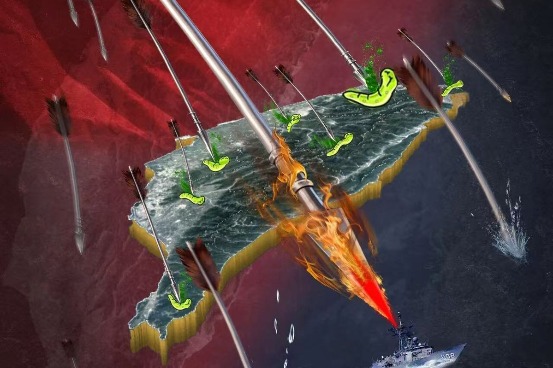Lessons to be learned
Victory anniversaries opportune time for countries to reflect on the mistakes of past and work together for global peace and prosperity


This year marks the 80th anniversary of victory in the Chinese People's War of Resistance Against Japanese Aggression (1931-45) and the World Anti-Fascist War.
Eighty years ago, the flames of the war spread across more than 80 countries and regions on four continents. On the global antifascist front, the Allied forces and peoples united with unwavering will and heroic struggle to defeat fascism, shattering its militarist ambition of dominating the world through war. The war also dismantled colonial systems that had lasted for centuries and established fundamental norms of international relations based on the purposes and principles of the Charter of the United Nations, laying the foundation for an international system centered around the UN.
In the 80 years since the end of the war, the world has, on the whole, remained at peace. Yet, wars have continued to break out due to the lessons of history being ignored, with hegemonism and power politics shaking the international order rooted in international law. Incomplete statistics show that between the end of World War II and 2001, the United States initiated 201 out of 248 armed conflicts worldwide — a staggering 81 percent. While fueling global warfare, the US has also profited enormously from the wars it has initiated and its unilateral interventions and sanctions. In recent years, it has further entrenched military alliances, reinforced its armed forces, imposed its "law of the jungle" upon the world, expanded its geopolitical strategies and attempted to rewrite global rules to serve US interests alone. This has not only brought turmoil but also deepened global mistrust.
The world today is undergoing profound changes. The international landscape is rapidly transitioning from the decline of unipolar dominance to deepening multipolarity. The Global South has risen significantly, with many emerging markets and developing economies growing rapidly. Cooperation mechanisms such as BRICS, the Shanghai Cooperation Organization, the Association of Southeast Asian Nations and the African Union have flourished, providing new momentum for multilateralism and global governance, and they have become an important force for promoting a more equitable and orderly multipolar world.
First, the international community must reject the logic of the strong bullying the weak — the law of the jungle has no place in a civilized world. Historically, fascist and militarist forces used military aggression to expand their territories, causing tremendous suffering. Yet the peoples of the world united under the banner of anti-fascism, defeated power politics and upheld justice. Today, some countries still openly embrace the law of the jungle, seeking peace through strength, placing their own interests above others and instrumentalizing international law and rules. This runs counter to the trajectory of human civilization. The world must resolutely reject such logic, steadfastly promote a more just and equitable multipolar world, safeguard the authority and role of the UN, uphold the UN Charter, practice genuine multilateralism and advance the democratization of international relations.
Second, double standards erode trust and cause lasting harm. Only by honoring commitments can we address the global trust deficit. History shows that a lack of trust between countries — growing suspicion and estrangement — is often a key trigger for war. Today, trust deficits persist globally. China-US relations face sustained challenges. Strategic trust between the US and Russia, and between Europe and Russia, has nearly gone. And small countries increasingly distrust major powers. Confidence in the UN system and international regimes governing trade, finance and nuclear security is faltering. The root cause lies in actions of double standards and the backtracking of certain major powers, which have undermined the UN's credibility and violated international law and basic norms. To prevent the collapse of global trust, all parties must uphold the authority of the UN, treat its resolutions with seriousness, embrace international rule of law based on the UN Charter, engage in dialogue among civilizations and preventive diplomacy, and build confidence through transparency — offering the world greater certainty and predictability.
Third, development is not a zero-sum game. Only by working together can we achieve shared prosperity. The tragedy of World War II was in many ways the ultimate result of zero-sum thinking. Fascist and militarist regimes believed in using force to seize resources and forcibly expand markets. Their national growth came at the direct expense of others, and such a model was destined to collapse. Today, similar patterns persist: tariffs are being raised, global market integration is being disregarded and other countries' technological development is being suppressed. All signs of zero-sum thinking at work. Yet economic globalization, rooted in complementarity and mutual benefit between different countries, has been a vital engine for postwar economic recovery and regional miracles.
Inclusive globalization emphasizes sharing over exclusion, replacing selfishness with mutual gains, so that economic growth truly benefits the vast majority of countries and people. Defending multilateral trade rules is an urgent global task. Countries must stand together against economic coercion and protectionism and inject new momentum into globalization.
Fourth, turbulent times demand responsible major powers. Public goods are key to energizing global cooperation. In a chaotic world, what's needed is not domination and exploitation, but those who rise to the occasion, uphold justice and follow the right path. Increasingly, the readiness to provide global public goods is seen as a defining feature of responsible major powers. On the one hand, for major countries, no act of goodwill is too small. China's vision of building a community with a shared future for humanity offers a conceptual public good for international cooperation and global governance. The three global initiatives it has put forward — the Global Development Initiative, the Global Security Initiative and the Global Civilization Initiative — draw from China's own development experience to offer solutions to global challenges. China remains committed to multilateralism, deepening South-South cooperation, supporting the development of the Global South and innovating aid models through the rollout of high-quality, small and beautiful projects that focus on grassroots development and governance. On the other hand, for some major countries, no act of disruption is too small to matter. Countries must cease undermining the international order and global rules, respect the development interests of others, stop promoting bloc confrontation, and refrain from opposing the common development and prosperity of the world.
The great way is not solitary; the world is one family. Eighty years after the end of World War II, peace and cooperation remain the dominant theme. Humanity has become a community of interdependence and one with a shared future. In facing today's challenges, no country can stand alone. Only by truly learning from the lessons of World War II can we enlighten future generations, preserve peace and jointly build a community with a shared future for humanity.


Liu Qing is vice-president and senior research fellow at the China Institute of International Studies (CIIS), and chairman of the China Committee of the Council for Security Cooperation in the Asia Pacific. Lin Duo is an assistant research fellow at the Department for Asia-Pacific Studies at the CIIS. The authors contributed this article to China Watch, a think tank powered by China Daily.
Contact the editor at editor@chinawatch.cn.


































